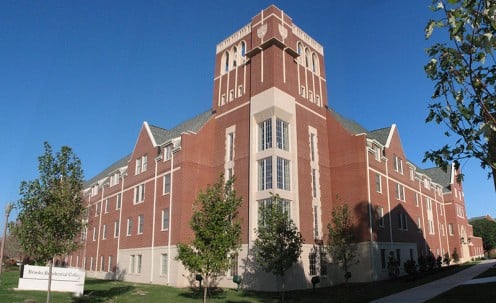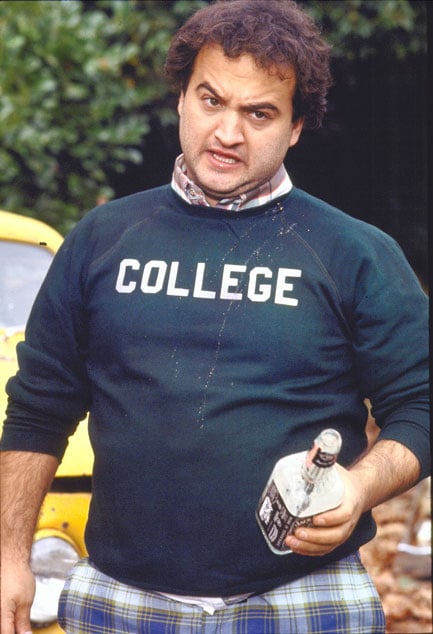How to Get the Most Out of College
Every student who attends college or is accepted into a university wants to have a great time. Many people say, when they get older, that college was the best time of their life. However, it can be intimidating for most college freshmen when they get to college to figure out just how to get started having the time of their lives. After all, there's they no small matter of taking classes and getting good grades and making sure that you put yourself on a solid career path. It's actually important to have a great experience.
There are definitely extremes when attending college. There are those who just want to party all the time and don't worry too much about their studies and there are those that hermitize the college experience and sit in their rooms studying until their eyes bleed.
There's definitely a happy medium between studying and partying and in order to have the best college experience possible, you want life balance. Here are some suggestions for making your college life the best that it can be.

Don't go to college until you're ready
Everyone has always assumed that the traditional thing to do is graduate from high school and go directly to college. However, this order of operations isn't for everyone. One of the best things you can do prior to going to college is take a few years off, work, and gain some practical experience in the real world. If you can afford it, getting an internship in the field you think you'd like to work in is a great thing to do. Want to be a doctor? Spend a year in a hospital. Lawyer? See if you can work at a law firm. And maybe you just want to travel. Then you should. Traveling will be a lot harder after you graduate and have to pay off all those nasty bills.
There is just absolutely no reason you need to go straight to college from high school if you don't feel like it. You don't get held back. There are no consequences. In fact, you may just enter college with the maturity you need to really succeed.

Make the most of your elective classes
Although you may be a business major or a chemistry major and stuck taking a whole bunch of required courses, make sure you expand your horizons with your elective courses. College is for learning stuff and exanding your field of knowlege and you'll be shocked at what's taught there. Take a course on graphic novels or James Bond films or the sexual practices of South American birds. Getting a well-rounded education will make you a more well-rounded person.
Take risks in school
When you get to college, don't be afraid to fail. I'm not talking about failing your classes, but challenging your professors, making new friends, trying things you'd never thought you'd try. Maybe you go on a semester at sea or learn how to ski by joining the skiing club or try performing stand-up comedy at a local club. Sometimes trying new things means failing at new things. You'll never know who you are and what you can do until you try.
I'll just provide a personal example: I tried stand-up comedy. I went in front of 900 people in a packed auditorium and absolutely bombed. I went on to perform again and do better, but the one thing that experience did for me was completely remove my fear of speaking in public. I now do a fair number of presentations to groups of people and really enjoy it. When people ask me how I got so comfortable in front of people when I'm not naturally that way, I always tell them the story of bombing at stand-up comedy.
Join a club
There's a club for everything in college. There's a club for every race and ethnicity and every religion. There are sororities and fraternities. There are clubs for people who like football and people who like chess. The club experience allows you to escape from the monotony of studying and inject some personal excitement in your life (unless you really like studying). It's also a great place to make friends who have similar interests.
Attend campus events
There are an incredible number of events on campus that appeal to every kind of taste. Most large universities will bring famous people to campus to speak all times of the year. These will be people you have heard of and those you haven't. Going to see people speak is a great way to expand your education, see something unexpected, and meet all kinds of people you might not normally meet.
Of course, there are typical campus events like football games, basketball games, and other typical stuff. Try some stuff off the beaten path where sporting events are concerned, like a lacrosse game or a track and field competition.
Then there are concerts. College is a great place to discover all kinds of music. Bands of every genre will be playing all over campus or all over your college town. Then there are films. College can be a spectacular place to expand your cinematic education. Aside from taking classes on film, most colleges host a film series of some sort and sneak previews of new films are fairly common as well.
Do things in your college's town
Exploring the town where your college resides is a great way to grow and learn. Almost every college town has its own set of events separate from the school. Learning about a town's character and experiencing its many faces may focus you on the kind of place you'd like to live. In fact, college towns are often so fabulous that many people who go to college there end up living there.
And another thing: eat. Your college town has a wide-range of food options. Try different restaurants. Eat out at a new restaurant whenever you can afford it. Refining your food sense is a great way to spend time, just don't get too fat.
Why did you choose the college you did?
Date people (a lot)
So many young people are fearful of dating because they're fearful of rejection. They're growing into their bodies, not sure who they are, and probably don't have a lot of sexual experience, yet assume that everyone they meet does. Don't be afraid to date. Dating builds confidence in your personal skills and those skills will help you for the rest of your life.
While I think it's a mistake not to date, I also think it's a mistake to try and have a steady partner throughout college. While some people do meet their life partner in college, most undergo far too many changes during these years. Simply put, you're not going to be the same person going into college that you are coming out. Don't tie yourself to a relationship unless the person you're with is willing to change with you.
This doesn't mean being promiscuous (unless that's your thing), just date and experience what it means to be infatuated and in love and everything else that goes along with dating.
Get a job or internship while in school
There are many benefits to having a job while you're in school, not the least of which is earning money to do the things that make college fun.
However, another huge advantage to having a job is that you learn how to manage your time. People who have jobs during college have to figure out just how much time to allocate to the activities they want to do. When they study, they have to make the most of it because they know they only have so many hours. And when they have fun, they don't want to waste their time because their time is precious.
And if nothing else, having a job and learning to be a good worker can give you a leg up on others when you enter professional life because, hopefully, your boss will write you a nice letter of recommendation.
Participate in class discussions
Even if you're an extreme introvert, don't just sit there and listen. Try as hard as you can to be an active part of your class. Be open-minded. Listen to others. Express your opinion. Be willing to accept criticism.

Research your professors
One of the best ways to have a great college experience is to have great teachers. Every school keeps pretty extensive records on professors and how they've been graded by their students. If you pick the classes taught by professors who consistently get good grades from the students they teach, you'll have a great time. Try to avoid those professors who get graded badly if you can. Taking great classes leads to great experiences.
Bonus Secret: Learn how to process criticism
Smart people, successful people, want to get better at everything they do. Unless you're a prodigy, the way most of us get better is by listening to people who are better than us at something tell us what to do. This usually involves criticism. Learning how to accept and invite criticism, then process that criticism into meaningful improvement, is one of the greatest gifts you can give yourself. Too many people hear criticism and roll up into a ball. By inviting and understanding criticism, you can learn to improve at everything you do and see every challenge as an opportunity.
My personal experience in this matter concerns a graduate teacher I had whose only assignment during class was a 3-page paper. This was highly unusual for a graduate course and, because I was a good writer and was told by all my professors I was a good writer, thought I'd ace her class and have nothing to do all semester. With my first effort, this professor marked up my paper and gave me an "F". I was furious, but I worked my butt off in that course and got an "A-" and learned how to really write well and understand when somebody was trying to help me and make me better at something. My writing improved more that semester than all the semesters of other teachers telling me what a good writer I was combined.








